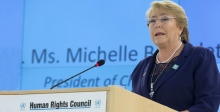Michelle Bachelet held her first opening statement as UN Human Rights chief

Human rights express the core purpose of the United Nations: we can only attain peace, security and sustainable development for all societies when we advance the dignity and equality of all human beings. In the course of my work, I fully intend to honour both the spirit and the practises established by my predecessors.
Read: The full opening statement of Michelle Bachelet
She promised to bring her experience from public service and lifelong dedication to reversing hatred and ensuring equality and respect for all into the mandate.
"I have been a political detainee"
Bachelet most recently served as President of Chile from 2014 to 2018, and 2006 to 2010.
I have been a political detainee and the daughter of political detainees. I have been a refugee and a physician – including for children who experienced torture, and the enforced disappearance of their parents. I have headed a United Nations body, and I have been honoured to lead my country, twice, as its President.
Bachelet also spoke about her own country and what the people have gone through for the last decades. She says she will use her experiences in her new position to promote human rights for all.
This is the eve of the day on which we Chileans mark the memory of the coup d'état, 45 years ago, and the ensuing years of brutal oppression and bloodshed. My country has known the pain and terror of tyranny. But I am proud to say we have been able to surmount divisions and meet vast challenges – shaping institutions which enable greater participation, and greater freedom, justice and dignity, for our people.
She continiued.
And so I bring to the cause of human rights the diversity of cultures that have nourished my approach to public service. I bring my commitment to bridging the differences between communities, and promoting respect, well-being and freedom.
Cannot pick and choose from human rights
Bachelet stated that the UN Human Rights Council also has the responsibility to speak out against every instance of human rights violations, regardless of sex, gender identity, race or ethnicity, religion, disability or migration status, or other characteristic. She said that we cannot pick and choose from among our people’s inalienable rights. They build on each other:
Measures to promote equality drive powerful, sustainable economic development to which every member of society can fully contribute. Access to the best quality education, and to economic and social rights, helps diminish despair, mistrust and violent extremism. It is by building access to all human rights that society becomes stronger and more able to resist unpredictable shocks.
Bachelet was appointed for a four-year term
Bachelet was earlier this year appointment for a four-year term as High Commissioner.
Michelle Bachelet will be the seventh High Commissioner since the Office was created in 1993. Zeid Ra’ad Al-Hussein has been in office since 1 September 2014. His predecessors are: José Ayala-Lasso (1994-97); Mary Robinson (1997-2002); Sergio Vieira de Mello (2002-03); Louise Arbour (2004-08); and Navi Pillay (2008-14).
About the High Commissioner position
The position of High Commissioner for Human Rights was established in 1993. At that time, the UN's human rights efforts and criticism against individual countries restricted themselves to those countries that had a weak position in the organization and make friends among the vet forces.
When the mandate of the High Commissioner was adopted, it was a key point that he or she should be responsible for promoting and protecting human rights everywhere. Since then, the UN has had the opportunity to respond to all human rights violations.

